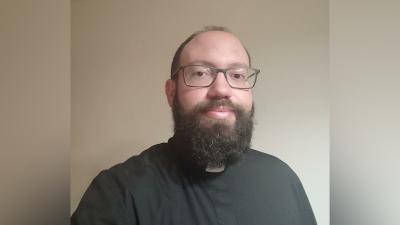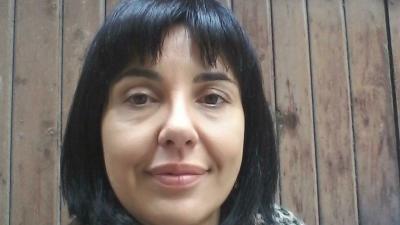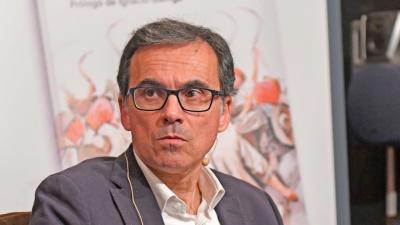Father Góngora: “If we absent ourselves from public spheres, we are negligently conceding ground to the enemy to spread his lies”
The Sacristy of the Vendée is a means to a clear objective: to propose the worldview of the Catholic tradition in times of moral relativism and ethical circumstantialism.
Juan Manuel Góngora Matarín is parochial vicar of San Isidro Labrador in El Ejido, La Inmaculada Concepción in Balerma and his churches in Matagorda and Guardias Viejas. He is also chaplain of the Hospital del poniente. Father Góngora is well known for his work on social networks: he has more than 70,000 followers on Twitter and a programme on YouTube, “La Sacristía de la Vendée – Una tertulia sacerdotal contrarrevolucionaria” (The Sacristy of the Vendée – A counter-revolutionary priestly gathering), in which he debates current affairs with other priests and which has more than 65,000 subscribers.
Álvaro Peñas: How did ‘The Sacristy of the Vendée’ come about?
Father Góngora: It is a project that God willing we started in October 2020 thanks to the initiative of Father Francisco José Delgado (Toledo), with the intention of creating a priestly talk show where current issues can be discussed in the light of Catholic doctrine and tradition.
The name of the Vendee is a declaration of principles. Do you think we are approaching a scenario like that of the Vendee, in which political power seeks to supplant religion?
What happened in the Vendée region (1793-1796) is a clear reference point as the first counter-revolutionary movement in the face of the orchestrated liquidation of the Christian order in the West. It is clear that the enemies of the Church are constantly seeking to supplant everything that the Catholic faith stands for in the heart of society, and to this end they are no longer using bloody persecution against Christians, as may have happened at other times in history or today in Africa or the East, but are trying to expel us from public life and applying a liberticidal political and media agenda that subjects us to marginalisation and indifference. They themselves recognise by their actions and words that Catholic morality is totally incompatible with the ideological currents they foolishly uphold, and social engineering is developing along these lines. That is why they want to impose alleged hate crimes on us for breathing and to silence us with various coercive methods. That is why it is necessary, in the face of the ideological revolution of the New World Order, to stand up against this globalising leviathan, and it is essential to make the Catholic counter-revolution grow.
What should be the Catholic’s stance in the world?
Follow the example of Christ: bear witness to the Truth. There is no greater weapon to combat what I have described above. There is no need for grand objectives or short-sighted planning, but rather to offer clarity in everyday life with the people around us, whether at work, in the family, with friends and neighbours.
However, for many, also within the Church, the role of Catholics should be to pray and not to speak out about anything that is happening.
It is true that there is a temptation to retreat into the comfort zone of good-naturedness and being nice to everyone. An accommodating stance encouraged by church officials who are more concerned with cold statistics and numbers than with reality, and which, far from evangelising, only means that little by little the Church’s presence in the midst of society becomes irrelevant and inconsequential. It has been proven that reducing us to social workers, socio-cultural animators or a pseudo-NGO with nice headquarters is a crass mistake, and the brutal secularisation we are suffering throughout Europe is an example of this. We cannot remain silent or only talk about those issues that will have the “blessing” of the political and media elite, either out of tacit complicity or for fear of what they will say or what they will do to us.
Are you satisfied with the reach of “The Sacristy” and is it important to use social media?
At no time did we imagine the reach and influence that this “sacristy” would achieve, but, as in everything that is placed in divine hands, the evangelical hundredfold is always applied. It is a means to a clear objective: to propose the worldview of the Catholic tradition in times of moral relativism and ethical circumstantialism, what we have received and cannot hide.
Social networks are a key tool for illuminating current affairs in the light of the Gospel, which is why I believe it is essential to have an active presence. If we absent ourselves from the public spheres, where the growing currents of opinion are currently being generated, we are negligently conceding ground to the enemy to spread his lies unhindered.
Have you had any problems within the Church because of the opinions expressed in the programme?
The Sacristy of the Vendée is an instrument that can be included in what is called the “apostolate of opinion”, always starting from adherence and fidelity to the deposit of faith. We ask for unity in the Truth and diversity in what is opinionated. We are aware that our work as communicators is annoying for those who actively exercise that good-naturedness and that “look good” that I mentioned earlier.
However, the support of so many people with their prayers and spiritual and material support helps us to continue, despite our mistakes and weaknesses as the sinners that we are, but with the certainty of knowing that we are doing good in times of confusion and ambiguity.
Read also
“Chechnya lives under a regime of terror where dissent is not allowed”: An interview with Marta Ter Ferrer
In Chechnya there is such absolute control that opposition is impossible. Criticising Kadyrov can result in a beating, public humiliation or even having your relatives’ house burned down.
Álvaro Peñas
Growing problems for the Soviet Federation
In a message on social media, Donald Trump claimed that Russia’s economy is crumbling and that he would do it the favour of allowing it to end a “stupid” war that should not have started.
Álvaro Peñas
Country Report: Spain & Portugal, March 2023
The political news in Spain in March was marked, much to the chagrin of the mainstream media, by the motion of censure presented by VOX against Pedro Sánchez’s government.
Álvaro Peñas
Manuel Acosta: “Since the very foundation of Spain, neither Catalonia could be understood without Spain, nor Spain without Catalonia”
Interview with Manuel Acosta Elías, PhD in Hispanic Philology, graduate in Geography and History from the University of Barcelona and VOX MP for Barcelona in the Parliament of Catalonia, where he is the spokesman for the University, Culture and Education Committees.














Comments (0)